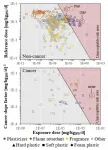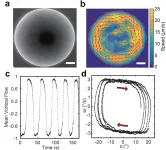Positive vibes only: Forego negative texts or risk being labelled a downer
University of Ottawa study finds using a negative emoji when texting -- in any context -- reflects negatively despite intent
2021-02-22
(Press-News.org) A new study from researchers at the University of Ottawa's School of Psychology has found that using negative emojis in text messages produces a negative perception of the sender regardless of their true intent.
Isabelle Boutet, a Full Professor in Psychology in the Faculty of Social Sciences, and her team's findings are included in the study 'Emojis influence emotional communication, social attributions, and information processing' which was published in Computers in Human Behavior.
Study background: Eye movements of 38 University of Ottawa volunteer undergraduate student participants were tracked and studied, and the volunteers were shown sentence-emoji pairing under 12 different conditions where sentences could be negative, positive, or neutral, accompanied by a negative emoji, positive emoji, neutral emoji, or no emoji. With an average age of 18, participants were asked to rate each message in terms of emotional state of the sender and how warm they found them to be.
Dr. Boutet, whose research aims at understanding how humans analyze social cues conveyed by faces, discusses the findings.
What did you discover?
"Emojis are consequential and have an impact on the interpretation of the sender by the receiver and if you display any form of negativity - even pairing a positive emoji with a negative message - it is going to be interpreted negatively. You are going to be perceived as a person who is cold, and you will come across as in a negative mood when using negative emojis, regardless of the tone.
"Even if you have a positive message with a negative emoji, the receiver will interpret the sender as being in a negative mood. Any reference to negativity will drive how people interpret your emotional state when you write a text message.
"We also found certain types of messages were more difficult to convey; people have a lot of problems interpreting messages that are meant to convey irony or sarcasm."
What does this tell us about texting vs. face-to-face interactions?
"People often try to control the emotion they convey with their faces to avoid social conflict. Yet people use emojis for fun without giving it much thought when, in fact, they have a strong impact on interpersonal interactions.
"The big question is do emojis act as proxies, do they engage the same mechanism as facial expressions of emotions that play a large role in face-to-face (FTF) interaction? With FTF interactions, we have - through evolution - developed very evolved mechanisms that process these facial expressions of emotions. Kids use a lot of these digital interactions and they risk losing the ability to interact FTF."
How can the use of emojis and their meaning be improved?
"There are a lot of emojis and many we don't even know what they mean, and people can easily misinterpret them. We are looking at developing new emojis that convey emotions in more consistent and accurate manner, that better mimic facial expressions of emotions and reduce the lexicon of emojis, which could be especially helpful to less tech-savvy older adults. Our goals are to develop new emojis and/or memojis that convey clear signals that are not as confusing."
Any final thoughts?
"You should not think that emojis are a cute little thing that you add in a text message and that it has no consequence on your interaction. Emojis have large consequence and strong impact on how your text message will be interpreted and how you will be perceived."
INFORMATION:
[Attachments] See images for this press release:

ELSE PRESS RELEASES FROM THIS DATE:
2021-02-22
Philadelphia, February 22, 2021--In April 2020, pediatricians began recognizing a puzzling syndrome in children involving hyperinflammation that results in an array of symptoms, including fever, gastrointestinal distress and rash. The syndrome, thought to be a post-infectious complication of SARS-CoV-2 infection, was given the name Multisystem Inflammatory Syndrome Children, or MIS-C. However, diagnosing the condition has posed challenges, as many of its symptoms, including rash, are common in many other pediatric infections.
In a study published in Open Forum Infectious Diseases, researchers at Children's Hospital of Philadelphia (CHOP) describe the ...
2021-02-22
It has long been known that several chemicals used in plastic toys in different parts of the world can be harmful to human health. However, it is difficult for parents to figure out how to avoid plastic toys containing chemicals that may cause possible health risks to their children.
Regulations and labelling schemes are different across regions and countries, and there is no international agreement on which substances should be banned from use in toy materials. For the most part, regulations and international lists of 'chemicals of concern' in toys focus on certain substance groups with known harmful properties, such as phthalates, but do not cover the wider range of chemicals found in plastic toys.
Researchers from DTU ...
2021-02-22
With the COVID-19 pandemic taking a disproportionate toll on low-income people of color, a research team headed by Marya Gwadz of the Silver School of Social Work at New York University set out to understand the ways the pandemic may put individuals at risk for adverse outcomes, and the ways they successfully adapted to and coped with the emerging pandemic, focused on those from low-socioeconomic status backgrounds who have lived with HIV for a decade or longer.
The team's newly published study explores the effects of COVID-19 on engagement in HIV care, HIV medication use and overall wellbeing during the early stages of the ...
2021-02-22
About 70% of the world's main crops depend on insect pollination. Climate change is already affecting the abundance and distribution of insects, which could cause geographical mismatches between crops and their pollinators. Crops that rely primarily on wild pollinators (e.g., crops that cannot be effectively pollinated by commercial colonies of honey bees) could be particularly in jeopardy. However, limited information on plant-pollinator associations and pollinator distributions complicate the assessment of climate change impacts on specific crops. To study the potential impacts of climate change on pollination of a specific crop in North America, we use the case of open?field ...
2021-02-22
Macrocyclic peptides are promising candidates for pharmaceuticals, but their screening is difficult. Scientists have now developed an easy-to-use, high-throughput screening assay for cyclic peptides with affinity to ubiquitin, a protein that helps to degrade proteins and induce cell death. The results could lead to novel drug candidates against cancer, according to the study published in the journal Angewandte Chemie.
Drugs based on peptides (small proteins) are often too large to pass through cell membranes. To make such peptides more compact and stable--and thus more efficient--researchers are investigating their closed versions, called macrocyclic ...
2021-02-22
This new finding may pave the way for fabricating a new class of self-driven devices and materials, such as the ability to control the rhythmic movement of soft robots without relying on electronic circuits, and for the study of microbial physiology. It has been published in the scientific journal Nature.
A fast growing and interdisciplinary field, active matter science studies systems consist of units where energy is spent locally to generate mechanical work. Active matter includes all living organisms from cells to animals, biopolymers driven by molecular motors, and synthetic self-propelled materials. Self-organisation (the process of producing ordered structures via interaction between ...
2021-02-22
A SARS-CoV-2 tracker uses publicly available sequencing data to show how the virus is changing and spreading over time. The tracker, called CovMT, was developed at KAUST and is expected to help researchers and policymakers understand the evolution of the virus's mutations. This could have implications for vaccine development, patient treatment and the implementation of restrictions.
"As new variants of the SARS-CoV-2 virus emerge, authorities around the world need to know if these, or similar variants, have entered their countries," says computational biologist, Intikhab Alam, who designed ...
2021-02-22
Treating waste brine using a self-cleaning crystallizer that runs on solar power could be an eco-friendly and efficient way to make seawater desalination more sustainable.
In desert regions, seawater desalination provides essential freshwater for drinking and agriculture. A major problem is that the process generates vast quantities of concentrated brine that is often released into nearby lakes and rivers or back into the sea, harming vegetation and marine life. "With tightening environmental regulations and increasing public awareness, there is pressure to treat brine with zero liquid discharge," says Chenlin Zhang, a Ph.D. student in KAUST. This means extracting every last drop of water while leaving behind solid mineral crystals that can be salvaged for other uses.
Crystallization ...
2021-02-22
Monoclonal antibodies are part of the therapeutic arsenal for eliminating cancer cells. Some make use of the immune system to act and belong to a class of treatment called "immunotherapies." But how do these antibodies function within the tumor? And how can we hope to improve their efficacy? Using innovative in vivo imaging approaches, scientists from the Institut Pasteur and Inserm visualized in real time how anti-CD20 antibodies, used to treat B-cell lymphoma, guide the immune system to attack tumor cells. Their findings were published in the journal Science Advances on February 19, 2021
Anti-CD20 antibodies are used in clinical practice to treat patients with B-cell lymphoma, a type of blood cancer. The treatment, often used in combination with chemotherapy, has been ...
2021-02-22
A mixture of smaller countries led by New Zealand, Vietnam, Taiwan, Thailand, Cyprus, Rwanda and Iceland led the world 's Top 10 countries to manage their COVID-19 response well, according to a new study.
In the study, published in The BMJ, lead researcher Flinders University's Professor Fran Baum joined experts from around the world to reflect upon the Global Health Security Index (October 2019) predictions for a public health emergency.
Along with Australia, Latvia and Sri Lanka among the best responders, the list highlights some of the 10 key causes of why some countries were successful or not in containing COVID-19 pandemic over the past year.
The US, UK, Netherlands, Australia, Canada, Thailand, Sweden, Denmark, South Korea, Finland (France, Slovenia and Switzerland) ...
LAST 30 PRESS RELEASES:
[Press-News.org] Positive vibes only: Forego negative texts or risk being labelled a downer
University of Ottawa study finds using a negative emoji when texting -- in any context -- reflects negatively despite intent




